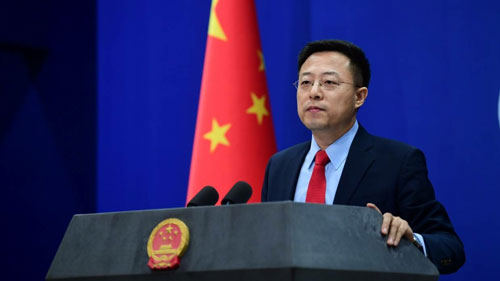Observer Report
Beijing
The right of ethnic groups in Xinjiang to use and develop their spoken and written languages is fully guaranteed under the constitution. This was stated by the spokesperson of the Chinese Foreign Ministry Zhao Lijian at a news briefing.
It was pointed out at the briefing that the US State Department posted a video it made on Twitter to accuse schools in Xinjiang of obliterating the spoken and written languages and religious beliefs of ethnic minorities.
It also said that in schools across Xinjiang, the Chinese Communist Party penalizes students and members of other Muslim minority groups for speaking their native languages.
Zhao Lijian said what’s depicted in this video is untrue. It tells nothing but lies and disinformation. He said, “ Ethnic minority languages are extensively used in such areas as education, judicature, administration and public affairs.
People of all ethnic groups in Xinjiang live a happy life, enjoying unprecedented convenience in life, production, work and study.
Some US politicians and officials has been framing that China disrespects the languages of ethnic minorities.
The Constitution and the Law on the Standard Spoken and Written Chinese Language stipulate that Chinese nationals have the right to learn and use standard language, and the country provides conditions for this purpose.
When performing official duties, Party and government organs of Xinjiang use at the same time standard Chinese and the languages of those ethnic minorities in the autonomous region.
Xinjiang People’s Broadcasting Station broadcasts 12 programs in Chinese, Uyghur, Kazakh, Kirghiz, and Mongolian. Xinjiang has set up Uyghur, Kazakh, Kirghiz, Mongolian and Xibe language courses for ethnic minority students at elementary and secondary schools.
On the streets of Xinjiang, multilingual services can be found everywhere in stores, postal and telecommunications services, medical services, traffic signs and other public areas.
The spokesperson suggested the critics to have a look at China’s RMB banknotes, on which Tibetan, Uyghur, Mongolian and ethnic Zhuang languages are printed beside mandarin. By contrast, is there any other language than English on a USD banknote?
“On religion, the freedom of religious belief of people of all ethnic groups is protected in accordance with law in Xinjiang.
All normal religious activities conducted by citizens in places of religious activity or in their own homes in accordance with religious customs, like worshiping, observing Ramadan and religious festivals are protected by law and shall not be interfered with by any organization or individual.
Xinjiang continues to improve the public service in mosques, which brings great convenience to the worship of religious believers. Religious classics like the Koran and Sahih al-Bukhari have been translated and published in Chinese, Uyghur, Kazakh and Kirghiz.
The China Islamic Institute and its eight branches are also set up. In recent years, tens of thousands of Muslims from Xinjiang have made pilgrimages to Saudi Arabia, and the customs and habits of Muslims of all ethnic groups in clothing, diets, festivals, weddings and funerals, have been fully respected.
Over the past two years, over 1,000 people from over 100 countries, including UN officials, diplomatic envoys in China, permanent representatives of relevant countries to the United Nations Office at Geneva, members of media and religious organizations have visited Xinjiang in more than 70 groups, witnessing Xinjiang’s economic and social development.
We believe that anyone who has been to Xinjiang and truly understand the real situation there will not accept the false information fabricated and disseminated by the U.S. side. The fact that Xinjiang enjoys political stability, economic development and social progress is the best response to these lie,” he added.









